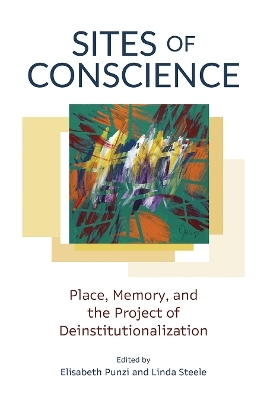
Sites of Conscience
University of British Columbia Press (Verlag)
978-0-7748-6933-1 (ISBN)
- Noch nicht erschienen (ca. Dezember 2024)
- Versandkostenfrei innerhalb Deutschlands
- Auch auf Rechnung
- Verfügbarkeit in der Filiale vor Ort prüfen
- Artikel merken
Into the twenty-first century, millions of disabled people and people experiencing mental distress were segregated from the rest of society and confined to residential institutions. Deinstitutionalization – the closure of these sites and integration of former residents into the community – has become increasingly commonplace. But this project is unfinished. Sites of Conscience explores use of the concept of sites of conscience, which involves place-based memory activities such as walking tours, survivor-authored social histories, and performances and artistic works in or generated from sites of systemic suffering and injustice. These activities offer new ways to move forward from the unfinished deinstitutionalization project and its failures. Covering diverse national contexts, this volume proposes that acknowledging the memories and lived experiences of former residents – and keeping histories and social heritage of institutions alive rather than simply closing sites – holds the greatest potential for recognition, accountability, and action.
Elisabeth Punzi is a clinical psychologist and an associate professor in the Department of Social Work and the Center for Critical Heritage Studies at Gothenburg University, Sweden. With Christoph Singer and Cornelia Wächter, she is co-editor of Negotiating Institutional Heritage and Wellbeing, and, with Annica Engström, of Mad Studies: Kulturarv och Konst. Linda Steele is an associate professor in the Faculty of Law at the University of Technology in Sydney, Australia. She is the author of Disability, Criminal Justice, and Law. With Claire Spivakovsky and Penelope Weller, she is co-editor of The Legacies of Institutionalisation: Disability, Law and Policy in the ‘Deinstitutionalised’ Community, and, with Gerard Goggin and Jessica Robyn Cadwallader, of Normalcy and Disability: Intersections among Norms, Law, and Culture. Contributors: Niklas Altermark, Gavin Andrews, Nicole Baur, Verusca Calabria, a conversation with Bec Dean, Lily Hibberd and Wart, Elena Demke, Rory du Plessis, Rob Ellis, Nigel Ingham, an interview with Alex Green, an interview with Janet Overfield-Shaw, Robin Kearns, Evadne Kelly, Helena Lindbom, Justine Lloyd, Nicole Matthews, David T. Mitchell, Graham Moon, Geoffrey Reaume, Carla Rice, Jen Rinaldi, Cecilia Rodéhn, Kate Rossiter, Sharon L. Snyder, Matilda Svensson Chowdhury, Liz Tilley, Jan Walmsley
Introduction: Sites of Conscience and the Unfinished Project of Deinstitutionalization / Linda Steele and Elisabeth Punzi
Part 1: Centring Survivor Voices and Experiences in the “Afterlives” of Disability and Psychiatric Institutions
1 Historical Memory, Anti-psychiatry, and Mad People’s History / Geoffrey Reaume
2 Contested Memorialization: Filling the “Empty Space” of the T4 Murders / Elena Demke
3 Names on Frosted Glass: From Fetishizing Perpetrator Mindsets to Disability Memorialization of the Victims / David T. Mitchell and Sharon L. Snyder
4 Truth, Reconciliation, and Disability Institutionalization in Massachusetts / An interview with Alex Green
5 “I’m Not Really Here”: Searching for Traces of Institutional Survivors in Their Records / Jen Rinaldi and Kate Rossiter
6 Listening to Peat Island: Planning, Press Coverage, and Deinstitutional Violence at a Potential Site of Conscience / Justine Lloyd and Nicole Matthews
7 “The Old Concept of Asylum Has a Valid Place”: Patient Experiences of Mental Hospitals as Therapeutic / Verusca Calabria and Rob Ellis
Part 2: Learning from Sites-of-Conscience Practices
8 Benevolent Asylum: Performance Art, Memory, and Decommissioned Psychiatric Institutions / A conversation with Bec Dean, Lily Hibberd, and Wart
9 Constructing History in the Post-institutional Era: Disability Theatre as a Site of Critique / Niklas Altermark and Matilda Svensson Chowdhury
10 The Workhouse and Infirmary Southwell: Collaboration with Learning-Disabled Neighbours and Partners / An interview with Janet Overfield-Shaw
11 Intellectual Disability in South Africa: Affirmative Stories and Photographs from the Grahamstown Lunatic Asylum, 1890–1920 / Rory du Plessis
12 Pathways to Disrupt Eugenics in Higher Education / Evadne Kelly and Carla Rice
13 “You Just Want to Do What’s Right”: Staff Collusion in Institutional Abuse of People with Learning Disabilities / Nigel Ingham, Jan Walmsley, and Liz Tilley
Part 3: Social Justice and Place Making in the Absence of Sites of Conscience
14 A Place to Have a Cup of Coffee: Remembering and Returning to a Dismantled Psychiatric Hospital / Helena Lindbom and Elisabeth Punzi
15 A Sense of Community within a Site of Amplified Stigma: The Strange Case of Spookers / Robin Kearns, Graham Moon, and Gavin Andrews
16 Naming Streets in a Post-asylum Landscape: Cultural Heritage Processes and the Politics of Ableism / Cecilia Rodéhn
17 “We Bent the Motorway”: Community Action on Exminster Hospital / Nicole Baur
List of Contributors; Index
| Erscheint lt. Verlag | 20.12.2024 |
|---|---|
| Reihe/Serie | Disability Culture and Politics |
| Zusatzinfo | 16 b&w photos |
| Verlagsort | Vancouver |
| Sprache | englisch |
| Maße | 152 x 229 mm |
| Themenwelt | Kunst / Musik / Theater |
| Geisteswissenschaften ► Geschichte ► Hilfswissenschaften | |
| Geschichte ► Teilgebiete der Geschichte ► Kulturgeschichte | |
| Sozialwissenschaften ► Soziologie | |
| Technik ► Architektur | |
| ISBN-10 | 0-7748-6933-X / 077486933X |
| ISBN-13 | 978-0-7748-6933-1 / 9780774869331 |
| Zustand | Neuware |
| Haben Sie eine Frage zum Produkt? |
aus dem Bereich


